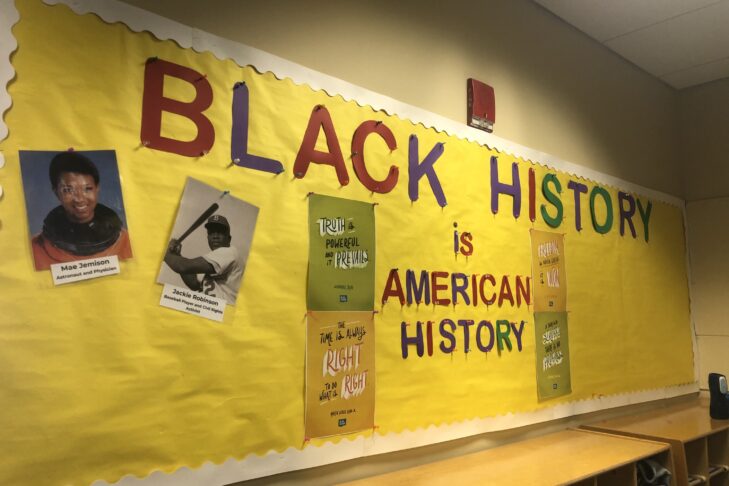The start of February marks the beginning of Black History Month, a time to highlight Black history and to reaffirm our commitment to include Black voices and narratives across all disciplines of study. This week, Kitat Arava (second grade) general studies teacher Naomi Greenfield created a new bulletin board outside Kitat Arava with the relevant message, “Black History Is American History.”
When we examine the arc of events and the people who helped shape the unfolding identity of our country, to leave out Black history and its heroes would leave us with the presence of a vast absence. Critical voices and stories of Black people who helped form what is today’s United States of America would provide an incomplete understanding of our country’s history. To this end, Kitat Arava will learn about one such hero each day of this month, add their photo to the bulletin board and create a book celebrating these heroes for each student to take home.
Students learned about the life of the first Black female astronaut, Dr. Mae Jemison, including second graders and nitzanim (kindergarteners), who watched an interview with Dr. Jemison to learn about her life and accomplishments. In Kitat Tamar (fifth grade), during open circle, students explored the meaning of discrimination and began to make authentic connections to Black History Month.
In this last year in particular, we have experienced the next chapter in the civil rights movement, demanding change in the way Black people are treated in our country and petitioning for policy changes that will give Black members of our communities the same opportunities that other groups have enjoyed for hundreds of years. In Sanhedrin 39b, the Talmud quotes the Mishna:
“And this serves to tell of the greatness of the Holy One, Blessed be He, as when a person stamps several coins with one seal, they are all similar to each other. But the supreme King of kings, the Holy One, Blessed be He, stamped all people with the seal of Adam the first man, as all of them are his offspring, and not one of them is similar to another. Therefore, since all humanity descends from one person, each and every person is obligated to say: The world was created for me, as one person can be the source of all humanity, and recognize the significance of his actions.”
This verse emphasizes that human equality is not only about recognizing the image of God in every human being, it is about the right of every person to know unequivocally that God created this world for them, with equal power to improve it in their lifetime. As Amanda Gorman wrote in her inaugural poem, “The Hill We Climb,” “We cannot just have a vision of justice/We must be able to envision ourselves in that vision/for justice to be served.” This Mishnaic quote lays the groundwork for a societal human equality beyond mere tolerance that includes the joyful, purposeful membership of all human beings in our world, family and community.
During Black History Month, we strive to bridge that gap from basic acceptance and dignity to a higher level of shared purpose, common joy and equal access to the development of our world. By learning about Black history and stories, our students begin to “envision [themselves] in that vision” of justice and become equal contributors to a better future for all people.
Shira Deener is head of school at JCDS.
The School Sparks blog appears periodically by various writers among the JCDS educational team. Learn more about JCDS, Boston’s Jewish Community Day School.
This post has been contributed by a third party. The opinions, facts and any media content are presented solely by the author, and JewishBoston assumes no responsibility for them. Want to add your voice to the conversation? Publish your own post here. MORE


